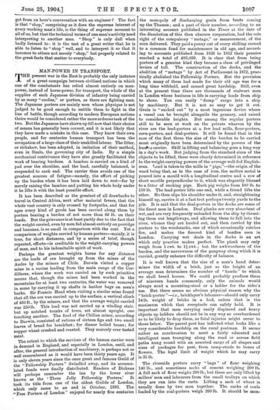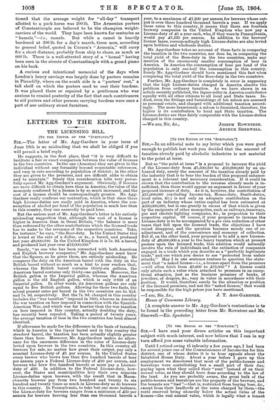T HE present war in the East is probably the only
instance of a great campaign between civilised nations in which one of the combatants has relied almost entirely on man- power, instead of horse-power, for transport, the whole of the supplies of each Japanese division of infantry being carried by as many "coolies," or porters, as there are fighting men. The Japanese porters are mainly men whose physique is not judged to be good enough to entitle them to fight in the line of battle, though according to modern European notions theirs would be considered rather the more arduous task of the two.. But the Japanese have shown up till now that their choice of means has generally been correct, and it is not likely that they have made a mistake in this case. They know their own people, and for centuries human transport has been the occupation of a large class of their unskilled labour. The litter, or rickshaw, has been adopted, in imitation of their method, even in Simla, the governing city of India. By a simple mechanical contrivance they have also greatly facilitated the work of bearing burdens. A bamboo is carried on. a kind of pad over the shoulder, and the load, carefully balanced, is suspended to each end. The carrier thus avoids one of the greatest sources of fatigue—namely, the effort of picking up the burden when it has been laid down to rest—for by merely raising the bamboo and putting his whole body under it he lifts it with the least possible effort.
It has been described as the greatest of all drawbacks to travel in Central Africa, next after malarial fevers, that the whole vast country is only crossed by footpaths, and that for ages every kind of goods has been carried along them by porters bearing a burden of not more than 60 lb. on their heads. But the grievance is at least partly due to the fact that the weight carried, even hymen fed almost entirely on porridge and bananas, is so small in comparison with the cost. Yet a comparison of weights carried by human porters—mainly, it is true, for short distances, and by a series of brief, though repeated, efforts—is creditable to the weight-carrying powers of man, and to his indomitable spirit of work.
• Perhaps the greatest weights borne for any distance are the loads of ore brought up from the mines of the Andes by the miners of Chile. Darwin visited a copper mine in a ravine leading from the main range of the Cor- dilleras, where the work was carried on by such primitive means that, though the mines had been worked in the mountains for at least two centuries, the water was removed in some by carrying it up shafts in leather bags on men's backs. Sir Francis Head when visiting a similar mine found that all the ore was carried up to the surface, a vertical climb of 450 ft., by the miners, and that the average weight carried was 250 lb. This load was not carried up a winding stair, but up notched trunks of trees, set almost upright, one touching another. The food of the Chili= miner, according to Darwin, consisted of rations of sixteen figs and two small loaves of bread for breakfast; for dinner boiled beans ; for supper wheat crushed and roasted. They scarcely ever tasted
The extent to which the services of the human carrier were in demand in England, and especially in London, until, and after, the general introduction of machinery, is perhaps not so well remembered as it would have been thirty years ago. It is only eleven years since the once great and famous Guild of the "Fellowship Porters" dwindled away, and its accumu- lated funds were finally distributed. Readers of Dickens will perhaps remember the inn by the lower river known as the 'Three Jolly Fellowship Porters.' It took its title from one of the oldest. Guilds of London, which only came to an end in October, 1893. The " Free Porters of London" enjoyed for nearly five centuries
interesting account published in the Times at the date of the dissolution of this then obscure corporation, had the sole right of the compulsory " metage," or measurement, of the corn delivered. They paid a penny out of every shilling earned to a common fund for maintenance in old age, and accord- ing to accounts published from 1826 to 1852 their pennies reached a total of 281,059. It is clear that from being porters of a genuine kind they became a class of privileged leviers of toll. The construction of the docks, and the
abolition of " metage " by Act of Parliament in 1872, prac- tically abolished the Fellowship Porters. But the provision which many of them had made for their old age was for a long time withheld, and caused great hardship. Still, even at the present time there are thousands of stalwart men in London whose business in life is carrying loads from ship to shore. You can easily " dump " cargo into a ship by machinery. But it is not so easy to get it out. Grain is "sucked out" by a most ingenious device where a vessel can be brought alongside the granary, and raised to considerable heights. But among the regular porters still to be seen at work on the private wharves by the river are the lead-porters at a few lead mills, flour-porters, corn-porters, and deal-porters. It will be found that in the case of the first three the size of the burden to be carried must originally have been determined by the powers of the huntiya carrier. Skill in lifting and balancing goes a long way in a day's work. But judging from the standard sizes of the objects to be lifted, these were clearly determined in reference to the weight-carrying powers of the average well-fed English- man. Lead is taken to the mills in "pigs,"—the origin of the word being that, as in the case of iron, the molten metal is poured into a mould with a longitudinal centre and a row of short moulds perpendicular to it, which was elegantly likened to a litter of sucking pigs. Each pig weighs from 100 lb. to 150 lb. The lead-porter lifts one end, while a friend lifts the other. He then slips his shoulder under it, and, straightening himself up, carries it at a fast trot perhaps twenty yards to the pile. It is said that the deal-porters in the docks are some of the finest men in London. Deal planks are very absorbent of wet, and are very frequently unloaded from the ship by thrust- ing them out lengthways, and allowing them to fall into the river, whence they are hauled out, and then carried by the porters to the woodstacks, one of which occasionally catches fire, and makes the fiercest kind of bonfire seen in London. Carrying wet deals in the docks is an art which only practice makes perfect. The plank may only weigh from 1 cwt. to lt cwt. ; but the awkwardness of the burden, and the narrowness of the gangway along which it is carried, greatly enhance the difficulty of balance.
It is well known that the size of a man's hand deter- mines the width of a brick, just as the height of an average man determines the number of " bands " to which we shall breed horses. We could probably produce them of nineteen bands commonly, only the animals would always need a mounting-stool or a ladder for the rider's use. But there seems no obvious physical reason why the "brick-porter "—i.e., bricklayer's labourer—should only carry 14 lb. weight of bricks in a hod, unless that is the maximum which that receptacle can safely hold. It is important that men carrying easily displaced and heavy objects up ladders should not be in any way so overburdened as to be likely to drop them, as fatal injuries might occur to those below. The parcel post has inflicted what looks like a very considerable hardship on the rural postman. It seems rather an anachronism to meet a fairly educated and intelligent man tramping along the road or across field paths hung round with an assorted cargo of all shapes and sizes of packages for post, from camp-stools to boxes of flowers. The legal limit of weight which he may carry is 35 lb.
The riverside porters carry " bags " of flour weighing i40 lb., and sometimes sacks of cement weighing 200 lb. A full sack of flour weighs 280 lb., but these are only lifted by millers' men and labourers from the small trolleys on which they are run into the carts. Lifting a sack of wheat is wnially done by two men together. The sacks of coals fouled by the coal-porters weigh• 200 lb. It should be men-
tioned that the average weight for " all-clay " transport allotted to a pack-horse was 200 lb. The Armenian porters of Constantinople are believed to be the champion weight- carriers of the world. They haye been known for centuries as " hamals,"—i.e., camels. But while a camel is heavily burdened at 300 lb. for a day's march, these men, according to general belief, quoted in Curzon's "Armenia," will carry for a short distance, probably from ship to shore, as much as 600 lb. There is a well-attested story of a " hainal " having been seen in the streets of Constantinople with a grand piano on his back.
A curious and intentional memorial of the days when London's heavy carriage was largely done by porters remains in Piccadilly, where on the south side is a "porters' rest," a tall shelf on which the porters used to rest their burdens. It was placed there or repaired by a gentleman who was anxious to remind posterity of the fact that such contrivances to aid porters and other persons carrying burdens were once a part of our ordinary street furniture.



























































 Previous page
Previous page